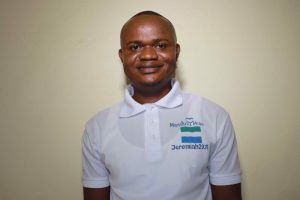The 200 members of Petifu Junction community pooled their resources to install a hand-dug well a few months ago. However, the well is already facing significant issues. Because the well doesn't have a substantial cover, it is open to all forms of contamination. The water has never been treated, causing illnesses throughout the community. The water changes color throughout the day as more people fetch from it, turning browner and browner as the hours go on. And because the well is shallow and hand-dug, everyone in the community knows its supply of water won't last through the upcoming dry season.
When the water turns brown and unappealing, community members head to the stream (in the photo below) which is not any better and is over a mile away through treacherous territory. The steep, narrow footpath becomes slippery and dangerous during the wet season and is infested with venomous snakes during the dry season. Many injuries have been reported from the people who choose to brave the long and arduous footpath.

So, for the moment, because their two sources are never enough (or never clean enough), people collect rainwater. But that, too, won't last forever.

"My worry is about the dry season when all these water sources would have lessened or dried," said Mabinty Kamara, 39, a trader collecting water above. "This is the most disturbing season in the year I would never like to go through."
"I have to walk down [to] the stream water source to wash clothes and carry them [back] to the community," Mabinty continued. "I can only do that once a week. It is challenging to carry wet clothes [and] climb the hill along the road from the stream water source. I have to go late to the market and come back quickly to fetch water to cook and provide water to drink and bathe. With this condition, I cannot realize a better sale. This greatly reduces my business."
 "It is challenging for me to fetch water from the stream," said Saidu C., 13, a boy from the village shown on the left. "The road is far and I cannot go there alone to fetch water because of the forest. I am afraid to be harmed. I am always worried to fetch water. Sometimes, I feel pain [in] my body because of the water I fetch every day, especially from the long distance. I have fallen on my way from the stream with a bucket on my head full of water and got injured on my knee and elbow."
"It is challenging for me to fetch water from the stream," said Saidu C., 13, a boy from the village shown on the left. "The road is far and I cannot go there alone to fetch water because of the forest. I am afraid to be harmed. I am always worried to fetch water. Sometimes, I feel pain [in] my body because of the water I fetch every day, especially from the long distance. I have fallen on my way from the stream with a bucket on my head full of water and got injured on my knee and elbow."
Converting the hand-dug well to a borehole will make an immense difference in the lives of these community members, especially children, who are carrying the brunt of the daily water-fetching work.
Here’s what we’re going to do about it:
Well Rehabilitation
The well marked for this overhaul is dry for a few months every year and needs major work to supply adequate, clean water to the community year round. The pump will be removed, and a hand auger will be lowered inside and powered by a drill team. This hand auger will allow the team to drill several meters deeper to hit a sufficient water column that will ensure the well supplies water throughout all seasons.
As the team drills, casing will be installed, transforming the bottom of this hand-dug well into a borehole. PVC piping will connect this lower system directly to the pump, a construction that we know will also improve the quality of water.
Once this plan is implemented, everyone within the community will have access to safe drinking water in both quality and quantity, even through the dry months.
Hygiene and Sanitation Training
There will be hygiene and sanitation training sessions offered for three days in a row.
After our visit, the hygiene and sanitation trainer decided it would be best to teach community members how to build a tippy tap (a hand-washing station built with a jerrycan, string, and sticks). They will use these tippy taps for handwashing demonstrations, and will also teach about other tools like dish racks and the importance of properly penning in animals.
These trainings will also strengthen the water user committee that manages and maintains this well. They enforce proper behavior and report to us whenever they need our help solving a serious problem, like a pump breakdown.

 Borehole Well and Hand Pump
Borehole Well and Hand Pump

































